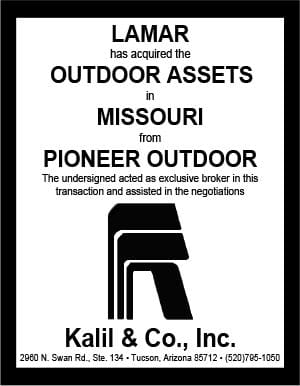
When selling or buying a billboard company, there is a routine due diligence process that must be followed to successfully complete any transaction. For nearly 20 years, Stark Capital Solutions has advised and represented a variety of buyers and sellers on over $315M worth of billboard-related M&A transactions. Throughout our years in the industry, we have seen certain recurring issues arise during the due diligence process that have slowed down — and even blown up — deals. Since no two transactions are the same, not every transaction will experience the same set of issues. In addition, every buyer and lender will go into different levels of detail when completing a due-diligence review. If you are thinking of buying or selling a billboard company in the future, here are the most common issues that arise. Addressing them now might help you avoid a slowdown in your transaction.
- Land leases not recorded
In most states, for a lease to be legally perfected, it needs to be recorded. If a property owner sells to a new property owner, the lease might not be enforceable if it was not recorded in the county records. The new owner could have the legal right to get out of the lease. Most billboard acquirers will run titles on leased properties and require sellers to get unrecorded leases recorded before they close a transaction.
- Wrong lessor executed lease
Whenever a title is pulled on a property, it is not uncommon to see the wrong lessor executing the lease agreement. One common example is when a property is jointly owned, but only one person has signed the lease. Another example is when an individual has signed the lease but has a company who legally owns the land. Incorrect lease executions will always compromise the speed of a transaction.
- Previous mortgage on property
When a buyer or lender does a title search on a property, many times there is a record of a mortgage that was filed prior to the land lease being recorded. In cases like this, the mortgage is considered superior to the land lease. This becomes a problem if the property owner defaults on their mortgage. In a foreclosure, the mortgage holder can extinguish the lease if they think it impairs the value of the property. Getting an SNDA (Subordination, Non-Disturbance, and Attornment) Agreement executed is a way to get around this problem, but it can be a complicated and time-consuming process.
- No site plan attached to land lease
A site plan should very clearly illustrate where a billboard location is, but often, they do not. Many title companies will not issue a policy without a clear site plan.
- Encroachment issues
Some billboard owners choose to build on the edge of their property to get as close to the road as possible and preserve as much free use as possible for the landowner. However, if you do not have a survey completed when you build your sign, you could end up building over your boundary and onto someone else’s property. This becomes a problem because it likely requires an adjacent property owner to consent to the sign encroachment or you may have to move your sign altogether.
- Consent to assign
This lease clause gives the property owner the ability to approve or deny who you choose to sell your billboard to. Waiting for their consent will cause a delay in your transaction.
- Right of refusal issues
Some land leases give the lessor the right of first refusal to buy the billboard if it is ever offered for sale. These types of clauses turn off buyers since they know their offer will be pending a third party having the opportunity to match the price and terms.
- Expired land leases or ad contracts
Some operators avoid renewing certain lease agreements out of fear that the property owner will renegotiate financial terms. We commonly refer to this as letting the sleeping dog lie. This may be convenient in the moment, but if you choose to sell or pledge the location as collateral, it will become a problem because you technically have an expired legal contract for your billboard site. The same holds true with ad contracts. An expired contract, even if you are still paying, might not be acceptable to a buyer and cause a delay or discount in price.
- Confusion on state permit requirements
You do not always need a state permit to operate a billboard. However, if your billboard is on a road that receives federal highway funding, obtaining a state permit is a requirement. We typically see confusion between what is considered a state highway and what is not, which ultimately causes slowdowns. Many states will still require a permit if your billboard is located on a side street but is visible from state roads.
- Access agreements
 When billboard owners need to cross a neighboring property to access their billboard, most buyers will require a written agreement documenting such access through third parties’ properties. Any time operators are required to obtain an agreement with a third party, a transaction delay is likely to occur.
When billboard owners need to cross a neighboring property to access their billboard, most buyers will require a written agreement documenting such access through third parties’ properties. Any time operators are required to obtain an agreement with a third party, a transaction delay is likely to occur.
- Termination clauses
Often, leases have termination rights where the lessor can terminate the lease in certain circumstances. One of the most common termination clauses is if a property owner decides to redevelop or sell their property, they may have a right to terminate the lease. If you choose to sell, any potential buyer will likely vet out the theoretical versus practical risks associated with all termination clauses as their expectation is the sign will be operational for the entire duration of the lease.
No matter when you decide to sell your billboard company, start thinking about these common slowdowns now. A clean due-diligence process will allow for a painless and efficient transaction. If you need a trusted advisor to help move your transaction along or work through any of the above issues with you prior to a sale, our team at Stark Capital Solutions has the expertise you may need. Email Chris at cstark@starkcapitalsolutions.com to schedule a call.
[wpforms id=”9787″]
Paid Advertisement

















